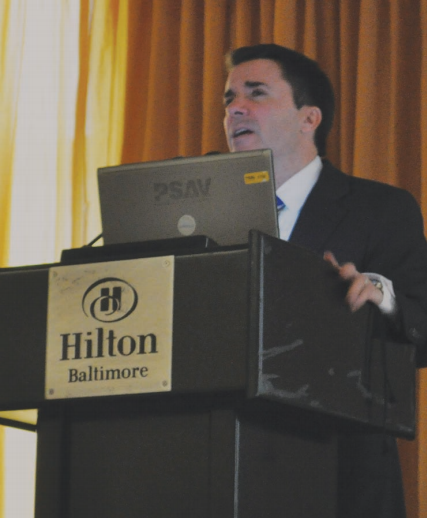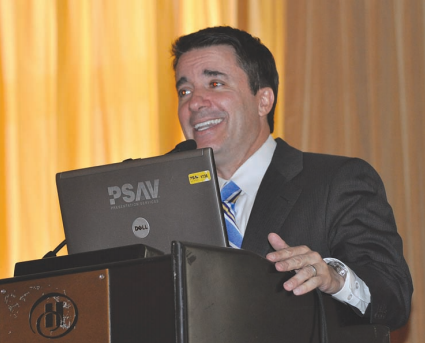John Whyte Knows Exactly Who His Audience Is

Know your audience was the mantra of John Whyte, whose hour-long keynote address kicked off the CSE annual meeting, 1–3 May in Baltimore, MD.
And Whyte knows his audience.
As chief medical expert and vice president of medical and patient education for the Discovery Channel, Whyte can spout the statistics. They are staggering: 785 million cumulative subscribers in the United States alone.
“Our motto at Discovery has been ‘Entertain Your Brain’,” Whyte said, acknowledging shows like “MythBusters” are not just popular but offer science as well. “Sometimes, people can learn without knowing,” he said. “But in the end, it has to be entertaining.”
He admitted that concept bothered him when he first went to the Discovery Channel a few years ago. Now, however, he knows some concepts are “good enough to start with” and perhaps people will be engaged enough to seek more details about the scientific or medical concepts presented on shows such as “How Stuff Works” or “New Year, New You.”
“At the end of the day, it’s about knowing your message,” Whyte said, adding he has concentrated on health specials in his time at Discovery. “You need to know your audience.”

Whyte said his audience relies on television much more heavily than on the Internet. Non-Internet users tend to be ethnic minorities, older, less educated, and less healthy, he noted.
“Are we leaving certain people or certain classes of people behind when we push more information onto the Internet?” he asked. He quipped, referring to the nearby Camden Yards baseball field, that “Just because you build it doesn’t mean they will come.”
“Sometimes people need smaller information bursts,” Whyte continued. “People are interested in the anomaly. They want to be entertained.”
Knowing your audience often means tailoring your message to suit different audiences, he said. Some like information one way; others prefer it another way.
For instance, at Discovery, an education series for medical professionals is offered on television. But DVDs and podcasts also are offered, and the information also is available on the Internet.
“At the end of the day, even if you have a great message but no one listened, does it really matter?” he said.
“MythBusters” is one of Discovery’s popular shows. Despite the antics of the hosts, Whyte stressed real science is being conveyed. “They’ve gotten people to watch and they’re doing it in a fun way,” he said. “I do think it reiterates the point that … sometimes you have to entertain them.”
Even when people search the Internet for scientific, medical, or technical information, Whyte said he questioned how much good information they receive. When asked about how they check the veracity of the data, people’s answers were less than encouraging, he said.
“They say, ‘I can tell. I know when people are right or wrong,’” he told the CSE audience.
For longer and more detailed information, people—even researchers—don’t always read the entire paper, Whyte said, adding many admitted they skipped to the conclusions of the reports.
He encouraged those attending the conference not to give up, saying many people wanted more information and more details as evidenced by the Discovery Channel’s success.
“Many people are interested in science, but they just don’t have the education,” he said.
TERESA M MELCHER is editor of CSE’s Science Editor


